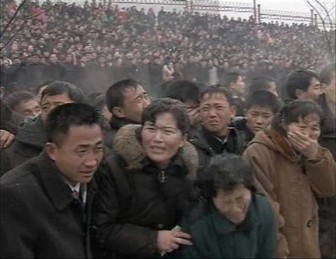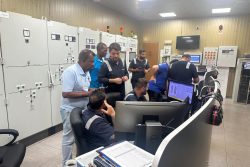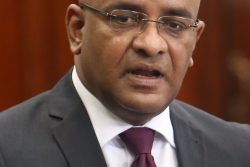SEOUL, (Reuters) – The world watched anxiously yesterday as North Korea staged a huge funeral in the capital, Pyongyang, for former leader Kim Jong-il, searching for signs of what to expect from the isolated nation that may be close to attaining nuclear weapons capacity.

Bleak pictures from state television showed a funeral cortege led by a limousine carrying a huge picture of the 69-year-old, who died on Dec. 17, passing serried ranks of olive green-clad soldiers whose bare heads were bowed in homage in the main square of the snow-covered capital.
A hearse carrying the coffin was led by a weeping Kim Jong-un, the son and heir, accompanied by Jang Song-thaek, his uncle and a key power-broker in the transition, and Ri Yong-ho, the army chief of staff.

“Seeing this white snow fall has made me think of the general’s efforts and this brings tears to my eyes,” Seo Ju-rim, a red-cheeked, weeping female soldier, told North Korean television, referring to the late Kim.
One of the myths surrounding Kim Jong-il was that he could control the weather and state media has reported unusually cold and wild weather accompanying his death.
Video showed weeping civilians who swayed with grief and shouted “father, father” as black Lincoln and Mercedes limousines and army trucks streamed past the crowds. It was not clear whether the pictures were live or recorded, although a state television announcer said it had been carried live.
“I wished it was a dream, how can this be true,” sobbed one middle-aged woman named Kim. “How can anything like this ever happen in the world?”
At one stage, weeping women were held back by men who linked arms to prevent them surging towards the cortege. The procession ended after about three hours with 21 guns fired in salute as the top leadership looked on from a podium.
Kim Jong-un will become the third member of the family to run the unpredictable North Asian country as it enters 2012, the year that was supposed to mark its self-proclaimed transformation into a “strong and prosperous” nation.
The North has conducted two nuclear tests and Larry Niksch, who has tracked North Korea for the non-partisan U.S. Congressional Research Service for 43 years, believes it could take as little as one to two years to have a working nuclear missile once it produced enough highly enriched uranium for the warhead’s core fuel.
The prospect of an untested leader, believed to be in his late 20s, having nuclear capacity has alarmed many.
“Yes, we are watching and will be analysing how any changes can be reflected in our policy,” a South Korean government official said. He was not authorised to speak to the media, so could not be identified.
UNCLE JANG, POWER BEHIND THE THRONE
State television showed Jang Song-thaek walking directly behind Kim Jong-un alongside the limousine carrying the coffin. Jang ranked a lowly 19th in the list of names on the state funeral committee but his public elevation confirmed that he will play a key role in shaping policies.
An ascetic-looking, bespectacled 65-year-old, Jang has overcome a purge, bitter palace intrigue and personal tragedy to become vice chairman of the National Defense Commission, the supreme leadership council which Kim Jong-il led as head of the military state.
“Kim Jong-un is clearly the head of the new leadership but, in terms of hierarchy and influence, Jang appears to have secured considerable position,” said Yoo Ho-yeol, a North Korea expert at Korea University in the South.
Strong it may be — North Korea is backed by neighbouring China and has a 1.2 million-strong armed forces — but prosperous it is not.
On average, the 25 million North Koreans have a life expectancy 3-1/2 years lower than they did when “Eternal President” Kim Il-sung, the new leader’s grandfather, died in 1994, according to U.N. data.
The United Nations, in a country programme for 2011-15, says North Korea’s main challenge is to “restore the economy to the level attained before 1990” and to alleviate food shortages for a third of its people.





